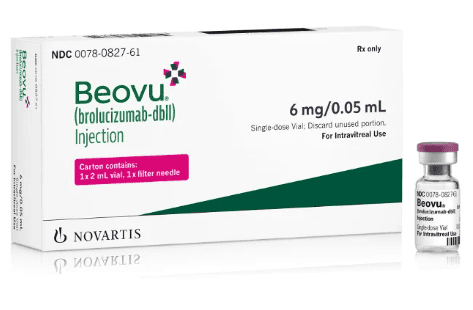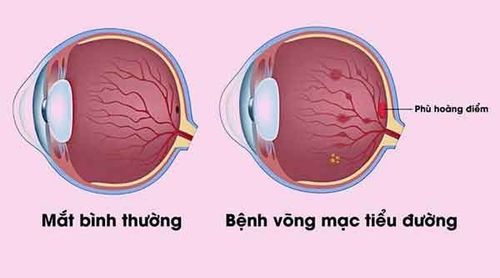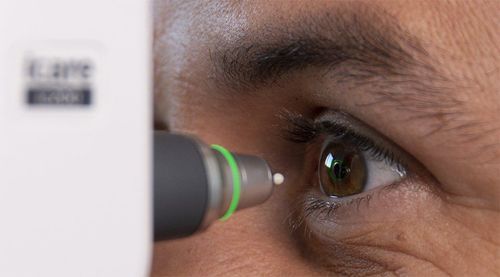This is an automatically translated article.
Yutiq is a medicine used to treat chronic non-infectious uveitis. The drug is put into the eye and works slowly to release a substance that reduces inflammation, thereby reducing the symptoms of the disease.
1. What is Yutiq?
Yutiq is a sterile tissue implantable device with the main ingredient Fluocinolone acetonide 0.18mg, after implantation, the drug will slowly release the active ingredient at an initial rate of 0.25mcg/day and lasting 36 month.
Each Yutiq includes a 3.5mm x 0.37mm, light brown implant containing 0.18mg of the active ingredient Fluocinolone acetonide and other ingredients such as a polyimide tube, polyvinyl alcohol, silicone binder and water to injection.
Fluocinolone is a Medium Potency Synthetic Glucocorticoid.
Corticosteroids inhibit the inflammatory response to stimuli, including many inflammatory cytokines. They inhibit edema, fibrin deposition, capillary dilation, leukocyte migration, capillary proliferation, fibroblast proliferation, collagen deposition, and inflammatory scar formation. Corticosteroids work by inhibiting phospholipase A 2 through the induction of inhibitory proteins known collectively as lipocortins. It has been found that these proteins control the biosynthesis of potent inflammatory mediators such as Prostaglandins and Leukotrienes by inhibiting the release of a common precursor, arachidonic acid.
Thanks to the anti-inflammatory activity of the drug that is used to put into the eye to treat chronic inflammation that can affect vision. The introduction of slow-release drugs helps patients control symptoms for longer and reduce inflammation for up to 36 months compared to the type that used to work for 6 months.
2. Indications and contraindications of the drug Yutiq
Indications:
Yutiq is indicated for the treatment of chronic noninfectious uveitis affecting the posterior part of the eye. Chronic uveitis is a disease that threatens to affect the patient's vision. The use of topical drugs helps to reduce the recurrence and reduce the need for systemic drugs causing many side effects. Do not use Yutiq in the following cases:
Eye infections or infections around the eyes: Yutiq is contraindicated in patients with active eye or periocular infections, including suspected cases including keratitis. herpes simplex epithelial varicella, bacterial infections and fungal diseases... Yutiq is contraindicated in patients with hypersensitivity to any of the ingredients of this product. The drug does not have enough safety data for use in children. Therefore, do not give this medicine to children.
3. How to take Yutiq
The drug is given by injection in the eye. This internal injection procedure must be performed under aseptic conditions.
The procedure for injecting Yutiq is done as follows:
Right before the injection, the patient is given local anesthesia, which can be numbed under the conjunctiva at the injection site. Get topical antibiotics to reduce the risk of eye infections. The optimal injection site of Yutiq is lower than the optic disc and behind the equator of the eye. Use the aseptic process to open the sterile foil pouch containing Yutiq. Remove Yutiq from the sterile bag, and then inspect the medicine container before starting the treatment. Carry out the procedure of inserting the drug-containing implant into the eye according to the instructions and performed by a specialist. After the injection, the patient needs to have intraocular pressure measured, to monitor the change in intraocular pressure and endophthalmitis. Monitoring may include measures such as checking the perfusion of the optic nerve immediately after the injection, measuring the amount of drug within 30 minutes of the injection, and checking again two to seven days later. when injected.
4. Possible side effects when taking Yutiq
Some possible side effects when taking the drug include:
In the eye: Cataracts, decreased vision; uveitis; conjunctival hemorrhage; pain/itching/discomfort and dry eyes; vitreous; conjunctivitis; congestion in the eye; conjunctival congestion; macular fibrosis; glaucoma; vitreous hemorrhage; eye inflammation; choroiditis; eye irritation; increased tear secretion. Nasopharyngitis; hypertension ; joint pain... When experiencing any unwanted effects, you need to report it to your doctor for advice and treatment if necessary.
5. Things to note when taking Yutiq
Yutiq, like other intraocular injections, has been associated with endophthalmitis, ocular inflammation, increased or decreased intraocular pressure, and choroidal/retinal detachment. This condition can be observed within 24 hours of injection and resolves within 2 weeks. Therefore, you need to be monitored after the injection to detect abnormalities early. Use of corticosteroids including Yutiq can cause posterior subcapsular cataracts and glaucoma, and the use of corticosteroids may increase the likelihood of developing secondary bacterial, fungal, or viral eye infections. Therefore, caution should be exercised when administering the drug to patients at risk for ocular infections or with a history of ocular herpes simplex, as this has the potential to reactivate viral infections. Note that in patients without posterior vitreous capsule or posterior capsule rupture there is a risk of implant displacement into the anterior chamber. For pregnant women: Adequate and well-controlled studies with Yutiq have not been performed in pregnant women. Because of this, it is not known whether Yutiq can harm an unborn baby when administered to a pregnant woman or affect a woman's fertility. Yutiq should be used during pregnancy only if the potential benefit outweighs the potential risk to the fetus. Lactation: Systemic corticosteroids pass into breast milk and may inhibit growth and interfere with endogenous corticosteroid production in nursing infants. The benefits of breastfeeding should be weighed against the possible risks to the infant. You may experience temporary blurred vision while taking the drug. It is not recommended to drive or use machines until vision has resolved. Inform your doctor about any medications you are taking or intend to take to avoid possible drug interactions. Hopefully, with the above information about Yutiq, you already know what this drug is for and how to use it. Drugs are used to reduce disease recurrence, reduce the risk of visual impairment and prolonged systemic drug use.
Please dial HOTLINE for more information or register for an appointment HERE. Download MyVinmec app to make appointments faster and to manage your bookings easily.













